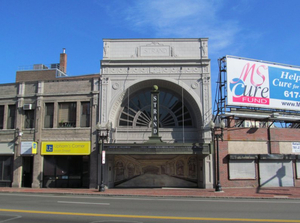Interview: Kara Elliott-Ortega And Marty Martinez on COVID TESTING at The Strand Theatre
Chiefs of Boston's Offices of Arts & Culture and Health & Human Services discuss what it means for an arts space to truly open its doors to the public

With limitations on gathering, like many arts spaces in the city, the Strand Theatre in Upham's Corner has been closed for a year now. However, its location in Dorchester and adjacent to Roxbury means it is easily accessible to members of communities who have been disproportionately affected by the pandemic, and Kara Elliott-Ortega, Chief of Arts and Culture for the city of Boston, believed the building could become useful from a public health perspective. "Dorchester is one of the most diverse communities in Boston," she explains as we chat over Zoom, "and the Strand should be useful to the neighborhood." She and her office set out to see what the "huge facility" could provide for the time being, and, in collaboration with the city's office of Health and Human Services, they mobilized the space as a COVID-19 testing facility.
Marty Martinez, Chief of Health and Human Services for the city of Boston, furthers, "the Strand is an important establishment within the community and it is a location people know. If I mention it, you know right where it is." This reasoning, he posits, makes the otherwise vacant building an ideal spot for testing, which is tentatively set to be offered there through July 30, 2021 with hopes that the site can also offer vaccinations as they become available to a broader public.
Martinez elaborates on the ways traffic flowing through the building needed to be adjusted for this current purpose. "Anything related to COVID is about infection control, so what might be nice for a flow of audiences at the theatre might not be what you want for a testing site. It's important we keep people distanced." Agreeing with this assessment, Elliott-Ortega notes that this reimagining of traffic flows will be imperative for cultural organizations when they eventually reopen. New layouts for movement will help to dictate how spaces are accommodating the public while keeping patrons and staff safe.
Additionally, this endeavor has made Elliott-Ortega reflect on the ways cultural spaces interact with and give value to their surrounding communities. "What does it mean to envision the Strand as a resilience space moving forward-- not just for COVID, but in the case of a natural disaster or energy crisis. We see other institutions raising their hands and asking how they can be helpful. There has been an outpouring of participation from arts spaces, but we are looking here at what it truly means to open your doors to the public. Arts spaces should be serving the community whenever possible."
Though she acknowledges the general public may not be familiar with the business models of the arts sector, she urges people to remember that "live events are not just going to flip a switch back to life. It's going to take time and planning to reopen." Martinez echoes, "COVID seemed to show up in a day. It changed lives fast. Recovering will not be fast. The overwhelming majority of the city is still not vaccinated, so we need to continue to take care of ourselves and each other. It's going to take a while to get to the other side."
As the mayor's guidelines open new possibilities and the weather gets warmer, it was refreshing to hear from people who are very much still engaged in servicing the city of Boston and taking seriously the current threat of the pandemic.
From their website:
The Strand, which is located at 543 Columbia Road in Upham's Corner in Dorchester, is open for testing on Mondays and Wednesdays, 8:30 a.m. - 4:00 p.m. There is no registration, and testing is walk-up only. Individuals can get tested for free, and regardless of symptoms or insurance. Individuals arriving for testing should enter through the main entrance of the building and will wait in line inside the theater. Testing will occur outside at a mobile van in the back parking lot of the Strand. There will be no public parking available at the Strand during testing.
Photo credit: John Phelan
Comments
Videos

